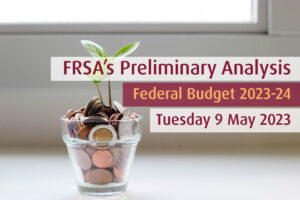 As I have often reflected on Budget night, Budgets are as much about giving us clear signs about the Government’s priorities as they are about how they choose to spend or not spend money.
As I have often reflected on Budget night, Budgets are as much about giving us clear signs about the Government’s priorities as they are about how they choose to spend or not spend money.
Given that all of the Family and Relationship Services Sector programs funded by the Department of Social Services and the Attorney-General’s Department have had funding extensions through until 30 June 2026, we definitely weren’t expecting anything in this Budget. As you recall, the Budget in October last year provided a boost to the Community Sector (Support for Community Sector Organisations totalling $560 million over four years) in an effort to meet increased wage costs and inflationary pressures over the forward years – so we weren’t expecting any additional relief on that front either.
Where the Government has chosen to invest funding clearly demonstrates its commitment to lifting the living standards of the most vulnerable and most disadvantaged in our community. Does the lift in Newstart, increase in Youth Allowance, increase in the Commonwealth Rent Assistance, Parenting Payment changes, increased access to Medicare Bulk Billing go far enough? No, it does not (even if looking at the combined impact of some of those changes), but given the cost of living pressures we are hearing about through our members and the vital work they are doing with children, young people and adults in our community – these measures will provide some welcome relief. Importantly, the changes show signs that the Government is receptive to acknowledging there are problems and issues that need fixing. That work will need to continue well beyond this Budget.
When we look at some of the programs and services with relevance to our sector that the Government has earmarked new funding for such as the Family Law Priority Property Pools Program (PPP500), Lawyer-Assisted Family Law Property Mediation Program, (both in the Family and Federal Circuit Courts and Legal Aid space), the ‘Targeting Entrenched Community Disadvantage’ measure including extension of the Stronger Places, Stronger people program – the rationale for doing so has been squarely focused and reliant on an evidence base to inform those funding decisions. Each of these programs has been evaluated.
The Government also provides some strong signalling about its keenness to invest in community led, place-based service delivery in the social services sector. What these decisions in this Budget do is provide great promise and opportunity for the Family and Relationship Services sector to continue to build and grow the case (the evidence-base) over the short term to feed into upcoming Budget discussions and decisions. It sets a favourable stage on which we can advocate for the children, young people, adults and communities we work with and could be working with if we were able to secure additional funding into the future.
We know that the Cost Benefit Analysis work FRSA is doing with the Centre for International Economics will provide a central catalyst to invigorate these discussions and conversations. In preliminary analysis of this work, we can see that the value of the FRS programs is significant. We also see evidence that the efficiency frontier findings in our previous report “Expiry of the Social and Community Services Pay Equity Special Account: implications for family and relationship services” and rising costs of wages and service delivery are biting. So too are the workforce pressures of finding the right people with the right skills to do our important work. With so many of the Family and Relationship Services sector programs playing such a vital role in providing interventions that keep people out of the tertiary end of service systems, given signalling in this Budget, we feel imbued with a deep sense of our ability to strongly advocate for greater investment in FRS services and the children, young people, adults and communities we work with – into the future.





